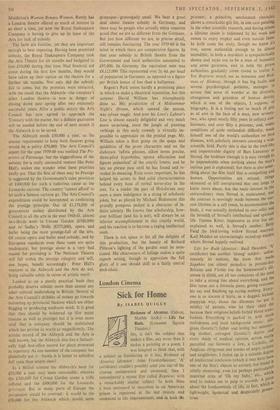London Cinema
Sick for Home
By ISABEL QUIGLY
No, it isn't the subject that makes a film, any more than it makes a painting or a poem. I was tempted to think that, with a subject as fascinating as it has, Birdman of Alcatraz (director: John Frankenheimer; 'A' certificate) couldn't possibly send you out of the cinema uninterested and unmoved; then I remembered a recent film called Reprieve, with a remarkably similar subject. In both films a man sentenced to execution in an American prison is reprieved at the last minute and sentenced to life imprisonment; and in both the SPECTATOR, SEPTEMBER 7, 196.2 prisoner, a primitive, uneducated character, shows a remarkable gift for, in one case painting, in the other scientific research, and during almost a lifetime inside is redeemed by his work and comes to enjoy respect and even outside fame. In both cases the story, though we know it's true, seems outlandish enough to be almost incredible; in both a murderer is sympathetically shown and turns out to be a man of humanitY and some greatness, and in both the prison authorities gradually come round to realise Yet Reprieve struck me as nonsense and Bird- man of Alcatraz, though it has big faults and several psychological potholes, manages to arouse that sense of wonder at the diversity, strangeness and grandeur of human destinY which is one of the objects, I suppose, of biography. It is a feeling not so much of pitY as of awe in the face of a man, now seventy- two, who spent nearly fifty years in solitary con- finement, and over fifty a prisoner, and, under conditions of quite outlandish difficulty, made himself one of the world's authorities on bird diseases, with_scholarly interests covering a wide scientific field. Partly this is due to the rock-like and impenetrable dignity of Burt Lancaster as Stroud, the birdman (though it is easy enough to be impenetrable when nothing about the man s curious past is explained); but there is also some- thing about the film itself that is compelling and human. Opportunities are missed, things skimmed or left unexplained that one longs to know more about, but the basic interest in the extraordinary man Stroud is maintained, and the contrast is movingly made between the nar- row lifetime in a cell (once, to accommodate the birds, it was actually stretched to two cells) and, the breadth of Stroud's intellectual and spiritual life. Thelma Ritter, impressive as ever but un- explained as well, is Stroud's mother; Betty Field the bird-loving widow Stroud married; Karl Malden an excruciatingly mixed-up warden whom Stroud happily outlived.
Life for Ruth (director: Basil Dearden; certificate) has another 'strong' subject: unfor- tunately its makers, the team that made Sapphire (on colour prejudice in present-day Britain) and Victim (on the homosexual's dil- emma in ditto), are all too conscious of the need to take a strong line about everything, and the film turns out a formula piece, giving everyone his say and finishing up saying nothing. Every- one is so sincere it hurts, in a dogged, kicked- puppyish way, about the dilemma (to put it ,. mildly) of parents who let their child die because their religious beliefs forbid blood trans" fusions. Everything is packed in, with trine,„ melodrama and loud background music:
gious (fanatic?) father and loving but unbeliev ing mother, outraged (fanatic?) doctor and every shade of medical opinion, action neatly parcelled out between a Jew, a Catholic, an
s Anglican clergyman and hordes of angry in-law and neighbours. 1 ended up in a suitable deg' of intellectual confusion (which it may have been one of the film's objects to arouse), but found it utterly unmoving; even (or perhaps particularly) maternal cries of 'Oh my baby,' etc-, which tend to reduce me to pulp in seconds. A .0.eei's about the fundamentals of life, in fact, which >s eight, hysterical and desperately preten- tious.


































 Previous page
Previous page